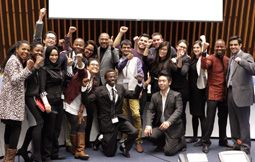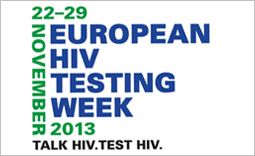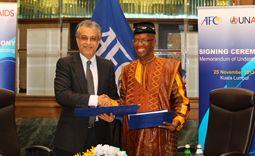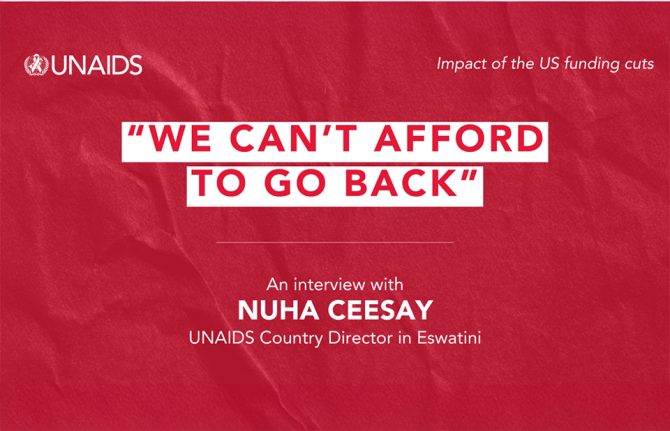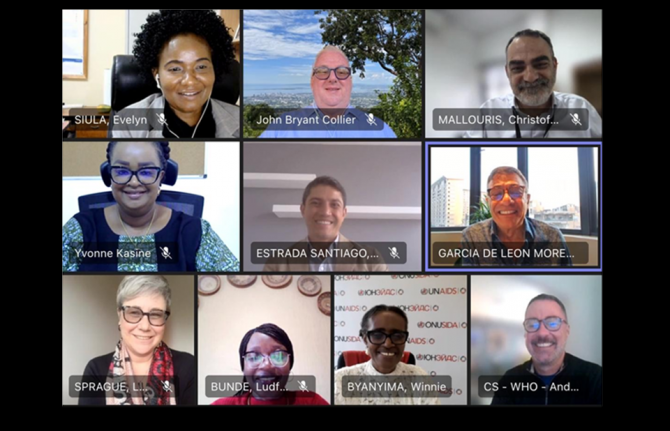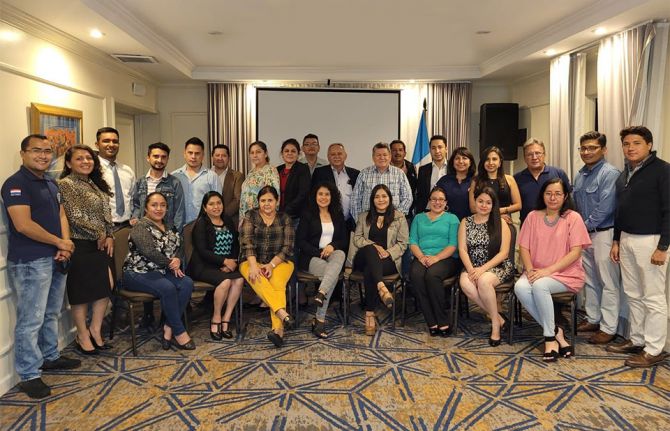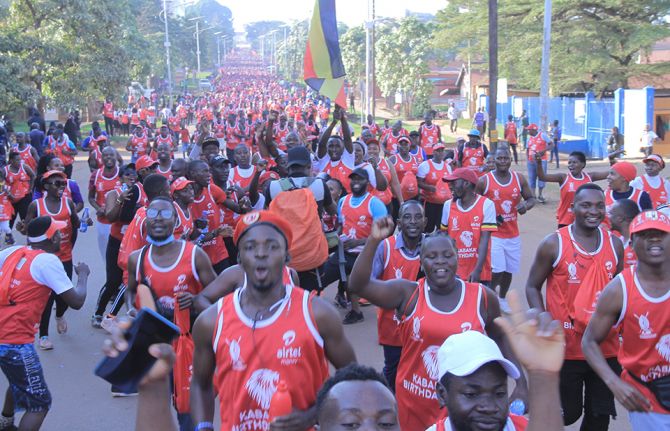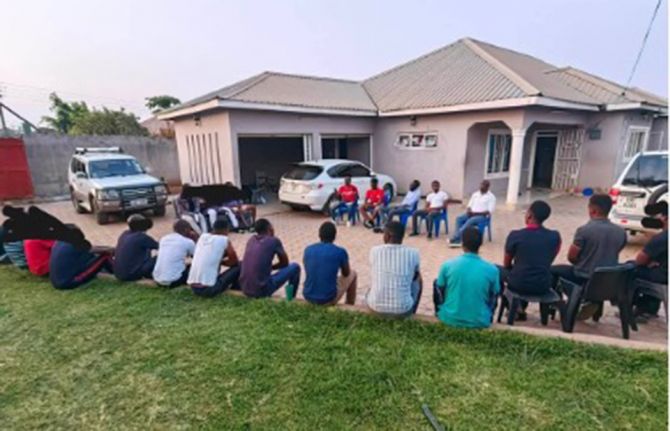
Feature Story
2009 HIV/AIDS Implementers' Meeting
10 June 2009
10 June 2009 10 June 2009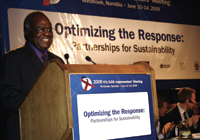
H.E. Hifikepunye Pohamba, President of the Republic of Namibia, addresses attendees at the opening of the 2009 HIV/AIDS Implementers’ Meeting in Windhoek, Namibia on June 10, 2009. Credit: Lukas Amakali.
From June 10-14, more than 1,500 implementers from around the world will gather in Windhoek to share best practices and lessons learned during the implementation of multi-sectoral AIDS programs with a focus on optimizing the impact of prevention, treatment and care programs; enhancing program quality; promoting coordination among partners; and encouraging innovative responses.
The 2009 HIV/AIDS Implementers' Meeting will be hosted by the Government of Namibia, and co-sponsored by the U.S. President’s Emergency Plan for AIDS Relief (PEPFAR); the Global Fund to Fight AIDS, Tuberculosis and Malaria; UNAIDS; UNICEF; the World Bank; the World Health Organization; and the Global Network of People Living with HIV/AIDS.
“With universal access as the overarching goal of the meeting, I hope that we will pay particular attention to the urgent need to strengthen HIV prevention efforts,” said Paul De Lay, UNAIDS Deputy Executive Director Programme, a.i., who will address participants at the opening of 2009 HIV/AIDS Implementers Meeting.
The conference theme is “Optimizing the Response: Partnerships for Sustainability.” Reflecting this theme, presentations will focus on what program implementers are doing to meet the challenges affecting the scale-up of HIV prevention, treatment and care. The meeting’s six research tracks cut across all subject matter areas of AIDS programming and include:
- Responding to challenges in HIV prevention;
- Women and children;
- Effective HIV prevention, treatment, care and support programmes for men who have sex with men, drug-users, people in prisons, and people in sex work;
- Evolving challenges in treatment, laboratory, care and support services;
- Performance-based programming and systems-strengthening; and
- Cross-cutting issues.
To learn more about the 2009 HIV/AIDS Implementers’ Meeting, please visit www.hivimplementers.org
2009 HIV/AIDS Implementers' Meeting
Partners:
U.S. President’s Emergency Plan for AIDS Relief (PEPFAR)
The Global Fund to Fight AIDS, Tuberculosis and Malaria
UNAIDS
UNICEF
World Bank
World Health Organization
Global Network of People Living with HIV/AIDS
Press centre:
Read Press release: 2009 HIV/AIDS Implementers’ Meeting Opens in Namibia
Read Press Release: Namibian President to Open 2009 HIV/AIDS Implementers’ Meeting
Speeches:
Read speech by UNAIDS Deputy Executive Director Programme, a.i. at the opening of the 2009 HIV/AIDS Implementers Meeting (10 June 2009)
Feature stories:
Grass roots projects supporting people living with HIV (12 June 2009)
HIV implementers gather in Kampala to share ideas, experiences in AIDS response (03 June 2008)
External links:
2009 HIV/AIDS Implementers’ Meeting official web site
Read live blog on the 2009 HIV/AIDS Implementers’ Meeting by former reporter for the Boston Globe John Donnelly
Related

Feature Story
Swaziland: WFP supports families living with HIV
08 June 2009
08 June 2009 08 June 2009A version of this story was first published at wfp.org
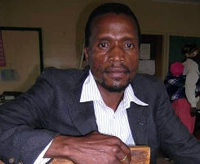
Vusie Maphalala takes part in a joint project run by WFP and Swaziland’s Ministry of Health.
Credit: WFP/Banele Dlamini
Dressed in his smartest suit, Vusie Maphalala waits patiently in the tiny health clinic in Mpolonjeni, located in Swaziland’s capital Mbabane, to collect his life-saving antiretroviral drugs. As a man with HIV, he knows that they are the key to survival – to living long enough to help his three small children grow up.
But he also knows that drugs alone are not enough.
Two years ago, he watched his wife die. She was on HIV treatment but was too weak and too malnourished to thrive. So Mr Maphalala comes each month not just to pick up his drugs but also his food ration which he receives under a joint project run by WFP and Swaziland’s Ministry of Health. Every month he receives more than seven kilogrammes of nutritious corn-soya blend known locally as ‘sidonono’.
Health started improving
“I was malnourished and virtually bedridden when I started getting food from WFP,” said 44-year-old Mr Maphalala, who had been battling to take the drugs on an empty stomach. “But within two months, my health and strength started improving.”
According to Martin Bloem, Chief of the HIV and Nutrition Service at WFP, “Good nutrition is essential in the treatment of HIV particularly in regions where it coincides with widespread malnutrition and tuberculosis. The current economic crisis makes it even harder for people on treatment to stay well fed."
There is no doubt, in Mr Maphalala’s mind, how important the food rations have been. “This area has often been hit by drought and sometimes there was no food, which made it very difficult to keep on taking my medication,” he said, knowing people who have been too hungry to continue their treatment. “But I don’t miss a single dose any more.”
Support to others
Now Mr Maphalala is healthy enough to do manual work and to look after his sons – as well as providing much-needed support to other HIV-positive people in his community who receive antiretroviral therapy (ART).
“As a volunteer, I help people who have recently enrolled in ART to plan their drug schedule,” he said. “I also teach them the importance of nutrition and explain that eating the corn-soya blend will help them stick to that schedule.”
Swaziland has one of the highest levels of HIV in the world. According to latest WHO/UNAIDS/UNICEF estimates, some 26 percent of the adult population is living with the virus. The 2008 Swaziland Country Progress Report states that prevalence among women is 31 percent. Young girls aged 15-24 are disproportionately affected and are nearly four times more likely to be infected than their male counterparts. The demand for treatment has been rising and in 2007 almost 60,000 people were in need of ART, 42% of whom received it.
Nutrition and food security are key components of treatment, care and support for individuals, families and communities affected by HIV, particularly in sub-Saharan Africa. Poor nutrition can hasten the onset of AIDS-related illnesses as well as making it more difficult to stick to ART. HIV also weakens the immune system and can impair food intake and absorption of nutrients. And in fact, those living with the virus need more food than those not infected. Adults with HIV have an energy requirement 10-30% higher than normal. This figure rises to 50-100% in children.
Addressing nutrition and food security is essential if the overarching international commitment to provide universal access to HIV prevention, treatment, care and support services by 2010 is to be met.
WFP implements AIDS programmes in over 50 countries addressing treatment, care and support and impact mitigation.
Swaziland: WFP supports families living with HIV
Cosponsors:
World Food Programme (WFP)
Feature stories:
HIV and high food prices (01 April 2009)
New UNAIDS policy on HIV, food security and nutrition (21 May 2008)
The impact of nutrition and HIV: World Food Programme (26 November 2008)
Publications:
The impact of nutrition and HIV: World Food Programme 26 November 2008 (pdf, 242 Kb.)
Linking Research and Action. Rethinking Food Aid to Fight AIDS (2004) (pdf, 35.3 Kb.)

Feature Story
UNAIDS Task Team develops effective tools to help young people tackle HIV
05 June 2009
05 June 2009 05 June 2009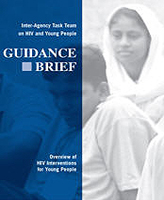
The seven Guidance Briefs on young people and HIV help strengthen the response to the epidemic among this key group
In 2007, around 40% of new infections were in the 15-24 age group and more than 5 million youth are living with the virus, around 60% of whom are girls.
Empowering young people to protect themselves from HIV is one of the eight priority focus areas for UNAIDS and its Cosponsors under the Joint action for results: UNAIDS outcome framework 2009-2011.
In order to give young people the urgent attention they need, a series of seven Guidance Briefs has been developed by the UNAIDS Inter-Agency Task Team (IATT) on HIV and Young People.
[A]s of 2007 only 40% of young men and 36% of young women had accurate knowledge about HIV, showing that even basic HIV awareness programmes have had inadequate reach…. It is essential that we sustain efforts being made as well as scale up the response.
Purnima Mane, UNFPA Deputy Executive Director and Michel Sidibé, UNAIDS Executive Director
The Task Team, convened by UNFPA, intends the Briefs to be used to guide staff, governments, donors and civil society on how to develop and implement an effective response to HIV among young people. Their needs, although reflecting those of the general population to a degree, are also very specific. In the foreword to the series Purnima Mane, UNFPA Deputy Executive Director and Michel Sidibé, UNAIDS Executive Director remark that there is still a long way to go in ensuring young people have access to knowledge.
They contend that despite a global commitment to ensure that 95% of youth have HIV-related information, education, services and life skills by 2010, “[A]s of 2007 only 40% of young men and 36% of young women had accurate knowledge about HIV, showing that even basic HIV awareness programmes have had inadequate reach…. It is essential that we sustain efforts being made as well as scale up the response.”
The needs of young people can often be overlooked during policy development as youth tend to lack a voice when it comes to decision-making around interventions designed for them. The briefs argue, based on global evidence, that their engagement in the development of HIV prevention programmes is not only desirable but “critical to programme success”.

Courtesy of UNFPA
The fourth Guidance Brief in the series, for example, which concentrates on community-based interventions, shows exactly how young people can become engaged in HIV prevention and really make a difference. In Ecuador transgendered youth in the Frontiers Prevention Project developed their own programme to mobilize their peers, who belong to a most-at-risk group, to address the epidemic. The Brief reports that they later formed the country’s first transgender non-governmental organization, demanding health services, challenging discrimination and promoting their human rights. Young people in Zambia are also shown to be getting involved, as they deliver care and support to people living with HIV in their communities.
The series includes an overview which highlights four key areas of action that focus on alleviating the effects of the epidemic on young people:
- Information to acquire knowledge
- Opportunities to develop life skills
- Age-appropriate health services
- The creation of a safe and supportive environment.
These must all be provided simultaneously, through behaviour change communication strategies, if interventions are to be successful.
The remaining Briefs examine most-at-risk young people and youth in a variety of settings; humanitarian emergencies, community based initiatives, in the health sector, the education sector and in the workplace. Again, the centrality and importance of young people in defining their own role in tackling HIV is demonstrated. The final Brief, concentrating on the workplace, reports that the ILO and its partners in Rwanda organized a youth consultation aimed at finding out their concerns and needs and working out a joint response. The young people said that opportunities for decent work and HIV prevention were “two sides of the same coin”. From this November 2007 meeting, the ‘Kigali call to action’ emerged, which includes measures to promote youth employment and challenge HIV.
The series is not designed to provide a one size fits all “blueprint” for every country to follow. The Task Team hopes that the Guidance Briefs, by presenting a raft of evidence-informed interventions, will encourage partners to explore what works for them in trying to ensure an HIV-free future generation - with young people helping to chart the way forward.
The UNAIDS Inter-Agency Task Team (IATT) on HIV and Young People was created in 2001 and is made of the UNAIDS Secretariat, the 10 UNAIDS Cosponsors, youth and civil society groups, research institutions and donors.
UNAIDS Task Team develops effective tools to help
The UNAIDS Inter-Agency Task Team (IATT) on HIV and Young People: Guidance Briefs:
Introduction and foreword
Overview of HIV Interventions for Young People
HIV Interventions for Most-at-risk Young People
HIV Interventions for Young People in Humanitarian Emergencies
Community-based HIV interventions for Young People
HIV Interventions for Young People in the Education Sector
HIV Interventions for Young People in the Health Sector
HIV Interventions for Young People in the Workplace
Key populations:
Cosponsors:
Feature stories:
HIV response and the education sector: UNESCO Best practice series (04 May 2009)
Prevention programming for young people (18 June 2007)
Publications:
Joint action for results: UNAIDS outcome framework 2009-2011 (pdf, 432 Kb.)
Preventing HIV/AIDS in young people: Evidence from developing countries on what works (2006) (pdf, 562.5 Kb.)
Young people and HIV: Hope for tomorrow (2004) (pdf, 1.09 Mb.)
Related

Feature Story
Michel Sidibé meets with UNDP Administrator
04 June 2009
04 June 2009 04 June 2009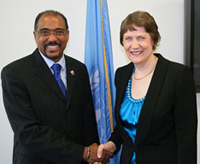
UNAIDS Executive Director Michel Sidibé met UNDP Administrator Helen Clark, 3 June 2009.
Credit: UNDP
UNAIDS Executive Director Michel Sidibé met with UNDP Administrator Helen Clark at UNDP headquarters in New York on 3 June 2009. The United Nations Development Programme (UNDP) is a Cosponsor of the Joint United Nations Programme on HIV/AIDS (UNAIDS).
Mr Sidibé and Ms Clark discussed maximising UNDP’s comparative advantage at the country level in support of national efforts to achieve universal access to HIV prevention, treatment, care and support as described in the UNAIDS Outcome Framework (2009-2011). The Framework calls for optimizing partnerships between the Secretariat and Cosponsors and leveraging respective organizational mandates and resources to work collectively to deliver results.
UNDP's response to AIDS stems from its human development, poverty reduction and governance mandates. Substantial progress on a number of Millennium Development Goals—including poverty, gender, education, and child and maternal mortality—can be achieved by integrating the AIDS response with efforts to achieve broader human development and the goals of health and social justice.
UNDP helps countries put HIV at the centre of national development and poverty reduction strategies. It also assists countries build national capacity to mobilize all levels of government and civil society for a coordinated and effective response to the epidemic; to protect the rights of people living with HIV as well as women and vulnerable populations.
Michel Sidibé meets with UNDP Administrator
Cosponsors:
Multimedia:
View photo gallery 3 June 2009
Publications:
Joint action for results: UNAIDS Outcome Framework (2009-2011) (pdf, 432 Kb.)
Related
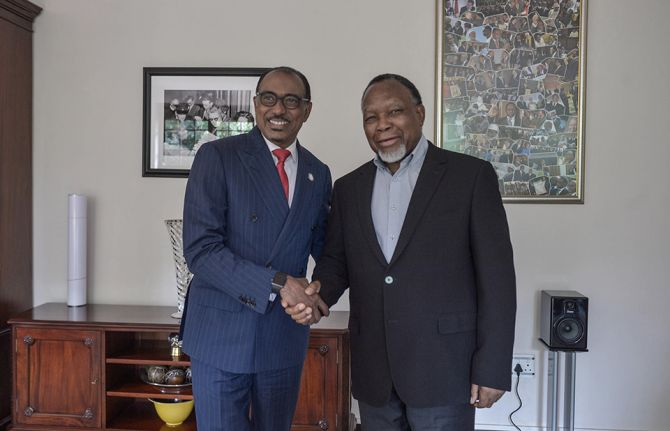 Keeping up the momentum in the global AIDS response
Keeping up the momentum in the global AIDS response

24 April 2019
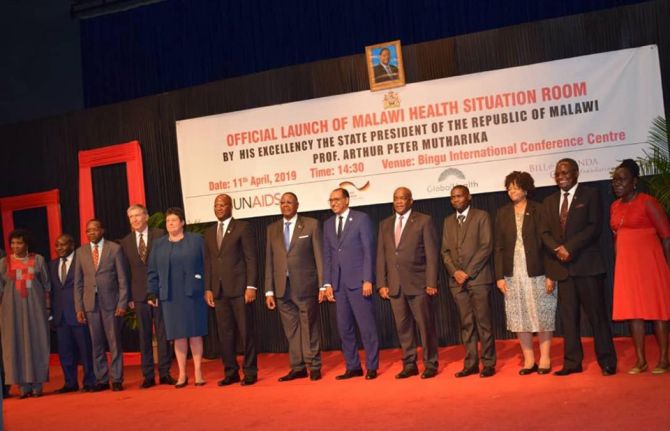 Malawi launches its health situation room
Malawi launches its health situation room

12 April 2019
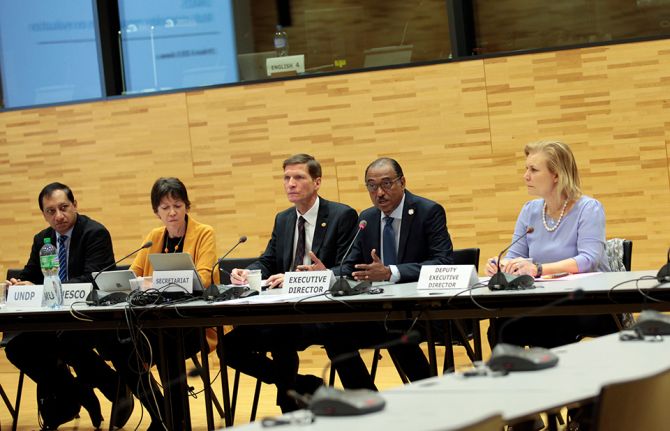 Learning lessons on evaluation
Learning lessons on evaluation

02 April 2019

Feature Story
Cricket stars launch global AIDS campaign
04 June 2009
04 June 2009 04 June 2009Watch the THINK WISE Public Service Announcements.
Featuring Sri Lankan Batsman Kumar Sangakkara, England international Isa Guha, international cricket stars and local South African children, South African captain Graeme Smith and Indian international Virender Sehwag.
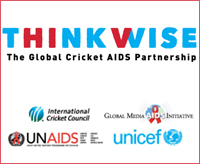
Leading cricketing stars are launching THINK WISE, a new global AIDS awareness campaign designed to provide young people with information about how to protect themselves from HIV.
The players will champion the campaign during the International Cricket Council (ICC) World Twenty20 2009, which begins in London on Friday 5 June. This leg of the campaign will aim to improve education and awareness about HIV and eliminate the stigma associated with the disease.
Around 10 million people living with HIV live in Test playing countries. This accounts for over a quarter of people across the world living with the virus.
I have seen firsthand the impact that HIV has had in my country. I hope that cricket fans and youngsters around the world can respect the disease and also those living with HIV. By making informed decisions we can help reduce new infections and develop strong communities.
Graeme Smith, Captain of the South African cricket team
Graeme Smith, captain of the South African cricket team and THINK WISE Champion said: “I have seen firsthand the impact that HIV has had in my country. I hope that cricket fans and youngsters around the world can respect the disease and also those living with HIV. By making informed decisions we can help reduce new infections and develop strong communities.”
Five new Public Service Announcements featuring messages from the Sri Lankan cricket captain, Kumar Sangakkara, Graeme Smith, one of India’s leading batsmen, Virender Sehwag, and England women’s cricket star Isa Guha, will be shown during the tournament on big screens in stadia and aired by broadcasters across the globe. Players will also wear red ribbons to show their support during the semi-finals and finals of the tournament.
The THINK WISE initiative builds on a long-term partnership between the ICC, the Joint United Nations Programme on HIV/AIDS (UNAIDS), UNICEF and the Global Media AIDS Initiative, that for more than five years has reached out to the cricketing community to respond to the global AIDS epidemic.
The THINK WISE partnership seeks to educate cricket players, coaches, commentators, broadcasters, volunteers and spectators about the AIDS epidemic, particularly around prevention, and deliver these messages at major ICC events and through broadcast which reaches an audience in excess of 200 countries.
The THINK WISE partnership will expand later this year to include a new cricket for development initiative that will deliver HIV messages to young people. An announcement is expected to take place during the ICC Champions Trophy 2009, hosted by South Africa at the end of September.
Cricket stars launch global AIDS campaign
Partners:
International Cricket Council
UNICEF
Global Media AIDS Initiative
Feature stories:
ICC and UNAIDS celebrate partnership and look to future (17 November 2008)
Press centre:
Global AIDS campaign launched ahead of ICC World Twenty20 encouraging young people across the world to 'THINK WISE’ (4 June 2009)
Multimedia:
Watch the THINK WISE Public Service Announcements. Featuring Sri Lankan Batsman Kumar Sangakkara, England international Isa Guha, international cricket stars and local South African children, South African captain Graeme Smith and Indian international Virender Sehwag.
Related

Feature Story
Peer educators raising HIV awareness through sport in Trinidad and Tobago
03 June 2009
03 June 2009 03 June 2009A version of this story was first published at UNICEF.org

With the picturesque backdrop of Speyside, northern Tobago, in the distance, Kalifa Martin and her colleague Kerlan conduct a UNICEF-supported 'Kicking Aids Out' workshop. Credit: UNICEF Trinidad and Tobago/2009
A UNICEF-supported programme called 'Kicking AIDS Out' (KAO) has recently begun in Speyside, northern Tobago, by the Trinidad and Tobago Alliance for Sport and Physical Education (TTASPE). The new programme uses sports and games to teach young people and adolescents about HIV. Speyside is a small community that is best known as a destination for fishermen and divers. In 2007, UNICEF and TTASPE, along with the Red Cross of Trinidad and Tobago, teamed up to conduct a youth-led Vulnerable Community Assessment. Based on this assessment, Speyside was selected as the first area to initiate 'Kicking AIDS Out'.
Training for adolescents
Soon after the assessment, UNICEF and TTASPE began conducting workshops to train adolescents to become KAO peer facilitators. Kalifa Martin, 15, is one these young trainees.
"I heard there was an HIV workshop at the community centre and decided to go and learn more about HIV, because I knew it was important to get the right information," Kalifa says. "What I wasn't expecting was that I would learn about it through games and fun activities. I liked this and invited my sisters to attend and we are now all involved in the programme."
Growing up in Speyside, Kalifa saw firsthand how AIDS can have a ripple effect.
"When something happens to one person, it affects the whole community," she says. "I want more people to get tested and start making wise choices. I would like Speyside to be an example to other communities."
Increasing the level of knowledge of HIV among young people in Trinidad and Tobago is an important step. According to a recent UNAIDS/WHO/UNICEF country report, in 2007 56% of young people aged 15-24 had correct knowledge of, and rejected myths about, sexual transmission of the virus. A significant minority, 12%, in this group had also had sex before the age of 15. The same report suggests that the situation is especially serious for young women as they are over three times more likely than their male counterparts to be living with the virus (0.3% of boys compared to 1% of girls aged 15-24).
'I want to help people'
Since her training, Kalifa has conducted many ‘Kicking AIDS Out’ workshops – where lectures are replaced by educational games that resonate with young people. One such game is similar to dodgeball, except that in the KAO version, being hit with the ball symbolizes being exposed to HIV. The message is that anyone who doesn’t protect themselves is vulnerable to infection.
"It is through projects such as KAO that UNICEF hopes to empower young persons such as Kalifa to actively re-create their communities as places where young persons make informed choices," explains UNICEF Trinidad and Tobago HIV Officer Marlon Thompson.
There are currently about 20 peer educators like Kalifa in the KAO programme. And she knows that the initiative is having positive results. She has seen her peers in Speyside become more knowledgeable about AIDS and then readily share their knowledge with their family members and friends.
The programme has also changed Kalifa, who now dreams of becoming a doctor. "I want to help people living with HIV and even find a cure for it," she says.
Peer educators raising HIV awareness through spor
Key populations:
Cosponsors:
UNICEF
Unite for Children, Unite against AIDS
Partners:
Trinidad and Tobago Alliance for Sport and Physical Education (TTASPE)
Feature stories:
UNICEF working to teach AIDS prevention to young people in Guinea (16 April 2009)
Condoms and HIV prevention: Position statement by UNAIDS, UNFPA and WHO (19 March 2009)
Costa Rica: Peer HIV prevention programmes to be promoted for young people (03 March 2009)
Publications:
Preventing HIV/AIDS in young People: A systematic review of the evidence from developing countries UNAIDS Inter-agency Task Team on Young People (2006) (pdf, 2.54 Mb.)
8 page summary (pdf, 562 Kb.)
4 page summary (pdf, 483 Kb.)
At the crossroads: Accelerating youth access to HIV/AIDS interventions (UNAIDS - 2004) (pdf, 297.5 Kb.)
UNAIDS action plan on intensifying HIV prevention (2006-2007) (pdf, 1.71 Mb.)
Peer education and HIV/AIDS: Concepts, uses and challenges (pdf 327 Kb.)
Related
 “Who will protect our young people?”
“Who will protect our young people?”

02 June 2025
 Comprehensive Update on HIV Programmes in the Dominican Republic
Comprehensive Update on HIV Programmes in the Dominican Republic

19 February 2025

Feature Story
International Labour Conference tackles HIV in the world of work
03 June 2009
03 June 2009 03 June 2009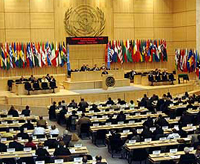
Credit: ILO
Some four thousand representatives of governments, workers’ and employers’ organizations from 183 states around the world are meeting in Geneva for the annual conference of the International Labour Organization. Challenging the AIDS epidemic is high on the agenda and the development of a new international labour standard on HIV and the world of work is one of the key issues for discussion during the Geneva conference which runs from 3-19 of June.
The new labour standard, ground-breaking in its scope and reach, is designed to address the global threat of HIV in the world of work and is an international human rights instrument aimed at extending and strengthening the role of the workplace in the AIDS response.
The existence of an instrument focusing solely on HIV and the world of work will give new impetus to anti-discrimination policies at national and workplace levels.
It will strengthen the contribution of the world of work to countries’ achievement of universal access to HIV prevention, treatment, care and support and encourage information-gathering and reporting.
Dr Sophia Kisting, ILO/AIDS Director, in an interview with ILO Online
The virus affects the most economically active age range in every population and the majority of the 33 million people living with HIV worldwide are workers. Many are still subject to stigma and discrimination and the threat, or reality, of losing their jobs due to their status. Although some progress has been made, prevention and care strategies also need bolstering. The international labour standard aims to help change this situation and would be the first global human rights instrument to focus specifically on HIV and the world of work.
According to Dr Sophia Kisting, ILO/AIDS Director, in an interview with ILO Online, “The existence of an instrument focusing solely on HIV and the world of work will give new impetus to anti-discrimination policies at national and workplace levels. It will strengthen the contribution of the world of work to countries’ achievement of universal access to HIV prevention, treatment, care and support and encourage information-gathering and reporting.”
The journey towards the international standard began when a first report, entitled HIV/AIDS and the world of work, Report IV (1), was sent to all ILO members in January last year. It contained a detailed and wide-ranging questionnaire concerning all aspects of the challenge to AIDS in the workplace. A second document, Report IV (2) , synthesized and summarized the nearly 250 responses received from governments, workers, employers and other partners, most of whom agreed with the need to focus greater attention on HIV through a new international instrument. It is the draft conclusions from this report that will be discussed in depth at the 2009 conference. A second discussion will take place next year and it is expected that the formal adoption of the labour standard will occur at this point. At present the proposal is for an autonomous Recommendation, but the final decision on its form and content rests with the Conference.
ILO Recommendations are not legally binding but serve as guidance for policy and law. If adopted, the new standard would be submitted to national authorities “for the enactment of legislation or other action” and would reinforce the impact of the existing ILO Code of Practice on HIV and the world of work which was adopted in 2001.
The global threat of HIV for workers is inextricably linked with the overarching theme of the International Labour Conference; the growing impact of the world financial crisis on employment and social protection. The ILO has organized a ‘Summit on the Global Jobs Crisis’ scheduled for 15-17 June, involving a number of Heads of State to examine this issue. The forecasts of rising unemployment and poverty have potentially grave implications for the successful response to the AIDS epidemic, given the connection between poverty and HIV.
The ILO highlights the fact that the crisis may lead to cutting of AIDS programmes. Increased poverty may also bring greater risk of HIV as some are forced into unsafe behaviour to support themselves. A recent World Bank report also stressed that funding for AIDS drugs is under threat as the crisis hits the health sectors in a number of countries in Africa, the Caribbean, Europe and Asia. The International Labour Conference is committed to trying to ensure that the many gains that have been made in the challenge to the epidemic in the workplace are not lost or reversed due to current, stark economic realities.
International Labour Conference tackles HIV in th
Cosponsors:
Feature stories:
Funding for AIDS drugs in jeopardy as global financial crisis hits health sector (28 April 2009)
ILO: Action against stigma brings hope to Ethiopia’s agricultural cooperatives (14 April 2009)
ILO and workplace leaders pledge action at ICASA 2008 (04 December 2008)
International labour standard would strengthen the HIV response in the workplace (21 July 2008)
ILO sees significant improvement in workplace attitudes to HIV (25 April 2008)
Health workforce crisis limits AIDS response (29 February 2008)
Multimedia:
Live webcast of selected whole panel discussions and plenary sessions
External links:
98th Session of the International Labour Conference, 3-19 June 2009: Daily update
Publications:
Report IV(2) HIV/AIDS and the world of work ( en | ar | ch | es | fr | ru )
Policy Brief - HIV and International Labour Migration (pdf, 203 Kb.)
AIDS is everybody's business: UNAIDS & business - working together (pdf, 863 Kb.)
Employers' handbook on HIV/AIDS : a guide for action (pdf, 599 Kb.)

Feature Story
UNAIDS and Principality of Monaco commit to strengthened cooperation in AIDS response
29 May 2009
29 May 2009 29 May 2009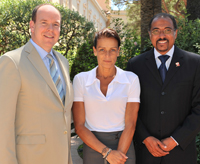
His Serene Highness Prince Albert II of Monaco; Her Serene Highness Princesse Stéphanie; UNAIDS Executive Director Michel Sidibé. Monaco 29 May 2009.
Credit: Gaëtan Luci/Palais Princier
Strengthened cooperation between UNAIDS and Monaco was the aim of Michel Sidibé, Executive Director of UNAIDS, on his first official visit to the Principality.
Mr Sidibé met with representatives of the government and civil society and had a private audience with His Serene Highness Prince Albert II of Monaco and his sister, Her Serene Highness Princess Stéphanie of Monaco.
This visit was an opportunity to renew the existing funding agreement between UNAIDS and Monaco for another two years until 2011. Mr Sidibé met with senior government officials including Mireille Pettiti, Directeur Général, Deputy Minister for Foreign Affairs, Monaco and Mr Frédéric Platini, Director of the International Cooperation Directorate of Monaco.
Cooperation between UNAIDS and Monaco has grown in recent years as has the country’s financial contribution to AIDS response in priority countries including Madagascar and Burundi. The role played by Her Serene Highness Princess Stéphanie as Goodwill Ambassador for UNAIDS has also reinforced this partnership.
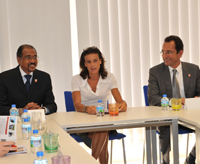
Her Serene Highness Princess Stéphanie (centre) and Jean-Jacques Campana, Conseiller de Gouvernement des Affaires Sociales et de la Santé (Minister of Health, Monaco) (right) met Michel Sidibé, UNAIDS Executive Director, 29 May 2009. Credit: Charly Gallo (Cdp) and Nicolas Saussier (Fight AIDS Monaco).
In his audience with the Prince Albert and Princess Stéphanie, his first in his role as UNAIDS Executive Director, Mr Sidibé emphasized the importance of their respective leadership in environmental protection and the response to the AIDS epidemic. Although Monaco is a country small in size, through their worldwide advocacy outreach, the leadership of the Prince and the Princess reach beyond its borders.
The Executive Director’s visit included a meeting with the association “Fight AIDS Monaco” of which HSH Princess Stéphanie is the founder and president. She introduced Mr Sidibé to the Board members as well as some of its members. Mr Sidibé emphasized the importance of having people living with HIV at the centre of the initiative in order to carry forward the movement they have created. He also explained the necessity of implementing the principle of greater involvement of people living with HIV, or GIPA.
Her Serene Highness Princess Stéphanie, Goodwill Ambassador for UNAIDS met Michel Sidibé, UNAIDS Executive Director, in Monaco on 29 May 2009. Credit: Charly Gallo (Cdp) and Nicolas Saussier (Fight AIDS Monaco).
Princess Stéphanie has been working with UNAIDS since 2006, focusing on HIV prevention and raising awareness on the negative impact of discrimination against people living with HIV. Through her personal engagement and work, she has become an important role model and significant UNAIDS Goodwill Ambassador.
Members of Fight AIDS Monaco share their experiences with Michel Sidibé, UNAIDS Executive Director and Her Serene Highness Princess Stéphanie, 29 May 2009. Credit: Charly Gallo (Cdp) and Nicolas Saussier (Fight AIDS Monaco).
The princess represented Monaco at the High Level Meeting on AIDS in New York in June 2006 where she expressed her personal commitment to the AIDS response.
She has twice visited Madagascar in 2007 and 2008 in order to raise awareness around HIV-related stigma and to support the local authorities and associations actively engaged in the AIDS response in their country. In 2008 HSH Princess Stéphanie renewed her commitment as UNAIDS Goodwill Ambassador for another two years.
The press conference which closed the visit was an opportunity to raise visibility for Monaco’s activities at national and international level with regard to HIV and show a strong sign of renewed commitment towards UNAIDS and the response to the epidemic.
UNAIDS and Principality of Monaco commit to stren
Related

Feature Story
Communities reclaiming their role in universal access to HIV services
29 May 2009
29 May 2009 29 May 2009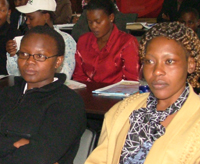
Participants at Global Citizens Summit to End AIDS which took place in Nairobi, Kenya from 27 to 29 May 2009. Credit: Global Citizen Summit 2009
Leonard is the father of five daughters, one of whom, recently turned 14, was born HIV positive. In addition to juggling with the responsibility of raising a family of girls, Leonard is becoming very concerned about the new challenges he’s facing with having a positive teenage girl at home. “She is growing and as a father, I must help her grow into a mature and responsible woman. How should I talk to her about sex given her HIV positive status without instilling a sense of guilt? I do not find the guidance to help me respond to her needs,” he said.
This question was one of many others at the core of the Global Citizens Summit to End AIDS which took place in Nairobi, Kenya from 27 to 29 May.
The Citizen’s Summit was organized by a determined group of civil society, including Africa CSO Coalition against HIV&AIDS, Asia People’s Alliance for combating HIV&AIDS, Africaso, Eanaso, Heard, Cegaa, OXFAM, ActionAid, the UN Millennium Campaign, Healthlink World Wide, Panos and Pamoja. The idea stemmed from the observation that there is a growing gap between the needs of the people at the forefront of the epidemic and the response that is offered at the global level.
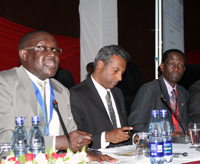
(from left) Leonard Okello of ActionAid, Salil Shetty, and Alloyce Orago of NACC during the official opening of the 2009 Citizens Summit Credit: Global Citizen Summit 2009
Addressing an audience of over 250 front line practitioners, Leonard Okello, who heads ActionAid’s HIV and AIDS unit, said: “We are meeting here at a time when the world is witnessing an increasing sense of AIDS fatigue, and witnessing serious global crises: food, climate, financial and emerging epidemics. A time when there is a big global debate on AIDS funding versus health funding and we, the people at the frontline of the AIDS response, are not on the debating table”.
During the three days meeting, the participants from grass root communities, networks of people living with HIV, faith based groups and other civil society groups came together under the umbrella of the Summit’s title “Reclaiming our Role in Universal Access” to share their experience at the front line of the response to AIDS. Their objective was to learn from their peers how they can better support people living and affected by HIV in their communities and where they can find support and guidance. The Summit was also an opportunity for them to consolidate in a roadmap the challenges that communities are facing on the road to universal access and how they could contribute to overcome them.
Representing UNAIDS at the Summit, Elhadj Amadou Sy, Deputy Executive Director ad interim, spoke of the importance of the communities’ role in scaling up towards universal access and reaffirmed UNAIDS commitment to support them in their constant and tireless efforts in the AIDS response. Referring to UNAIDS Outcome Framework for 2009-2011, he reiterated UNAIDS commitment to stand by people living and affected by HIV and to enable them to demand change in governance, legislation and policy to support a response that works for them.
Building on their previous advocacy experience in 2005 which led to the G8 commitment made in Gleneagles to move as close as possible to universal access to HIV prevention, treatment, care and support by 2010, ActionAid is planning to use the Summit’s roadmap to create a new impetus for demanding the right to universal access to prevention, treatment, care and support. At the Summit, ActionAid also launched STAR, a human rights based social mobilization methodology aiming at enabling and empowering communities to protect themselves from HIV infection and to demand their rights to prevention, treatment and care.
Right Hand Content
External links:
Publications:
Joint action for results: UNAIDS Outcome Framework for 2009-2011 (pdf, 432 Kb.)
Related

Feature Story
Early diagnosis and treatment save babies from AIDS-related death
27 May 2009
27 May 2009 27 May 2009A version of this story first appeared at unicef.org
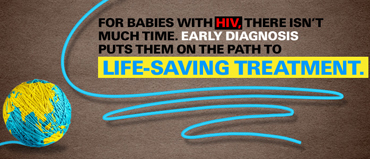
‘Loud and Clear’, the Unite for Children, Unite against AIDS video, shows how early infant diagnosis of HIV can save lives
Many infants across the world are dying needlessly because they are not being tested early enough for HIV and treated if they have the virus. Without treatment, half of all HIV-positive babies will not live long enough to see their second birthday; a third will not see their first.
To help address this situation, the Unite for Children, Unite against AIDS campaign has launched a new video vividly highlighting the importance of early testing and treatment to save the lives of infants who have HIV.
As the video, known as ‘Loud and Clear’, shows infants who are diagnosed and treated early have a far higher chance of survival than those who go untested and untreated. Research demonstrates that if newborns are tested at the age of six weeks and on treatment by 12 weeks there can be a dramatic 75% reduction in infant mortality due to AIDS.
However, according to a report published last year by UNICEF, UNAIDS and WHO, in 2007 only 8% of children born to HIV-positive mothers were tested before they were two months old. Mothers can also help prevent HIV transmission – and protect their own health – by being tested and treated themselves during pregnancy.
Access to care and treatment
Since the launch of the Unite for Children, Unite against AIDS global campaign in 2005, there has been significant progress in scaling up prevention of mother-to-child transmission of HIV – and in the provision of paediatric treatment for babies born with the virus.
In 2007, a third of HIV-positive pregnant women received antiretroviral drugs, or ARVs, to prevent transmission to their children, compared with only 10 per cent in 2004.
Still, far too few pregnant women in the developing world know their HIV status, and too few are tested and treated: both are essential for mother and child. However, most pregnant women who have been diagnosed with HIV do not have access to essential care and treatment, including ARV therapy.
“Mothers should be able to access the tests and drugs necessary to ensure they can protect their babies and themselves,” said UNICEF Senior Advisor on HIV and AIDS, Dr Doreen Mulenga. “Antiretroviral drugs can substantially reduce the risk of a baby getting the HIV virus from his mother.”
Children at risk
Children bear a heavy burden of the virus. UNAIDS and WHO estimates show that in 2007 alone some 370,000 young people under the age of 15 were newly infected, that’s around 1,000 a day; and 270,000 died, the majority under the age of 5. In the same year, fewer than 200,000 young people living with HIV received antiretroviral treatment. Further, those on ARVs often receive it too late for optimal benefits to be gained: recent studies report that the median age at which children begin such treatment is between five and nine years old.
Great strides in Zambia
In Lusaka, the capital of Zambia, the Chelstone Clinic provides vital programmes to treat pregnant women living with HIV and to prevent mother-to-child transmission. The country has made great strides in expanding such programmes, which include HIV testing during pregnancy, ARV regimens for HIV-positive pregnant women, prophylactic antibiotics and ARVs for infants exposed to HIV in utero, and early infant diagnosis and treatment.
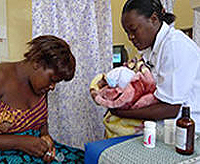
Maureen Sakala, who was diagnosed with HIV while pregnant, practices preparing prophylactic antiretroviral medicine for her newborn son, Christopher, held by midwife Grace Kayumba at the Chelstone Clinic in Lusaka, Zambia.
Credit: UNICEF/NYHQ2009-0307/Nesbitt
Christopher was recently born at the clinic. His mother, Maureen Sakala, lives with her mother, siblings and 12 orphaned children – including the children of her brother, who died of AIDS-related illness.
Ms Sakala learned that she was HIV-positive during an antenatal check-up. She participates in the prevention programme at the clinic, where she learned to administer ARVs to Christopher for the first seven days after his birth as a prophylactic measure against HIV infection. His chances of survival are much improved because of Zambia’s success in strengthening maternal, newborn and child health services.
Preventing mothers from dying and babies from becoming infected with HIV has been identified as one of the eight priority areas UNAIDS and its Cosponsors will focus on for the period 2009–2011 under the Joint action for results: UNAIDS outcome framework, 2009 – 2011.
By providing greater access to HIV testing and treatment, partners around the world are working to protect babies like Christopher, and their mothers, from the devastating impact of AIDS.
Early diagnosis and treatment save babies from AI
Cosponsors:
Partners:
Unite for Children, Unite against AIDS
Feature stories:
Early infant HIV diagnosis helps save lives in Malawi (01 December 2008)
UNICEF: Communities provide a bigger ‘family’ for orphaned children in Rwanda (09 March 2009)
Third stocktaking report on children and AIDS (01 December 2008)
Multimedia:
'Loud and Clear' video: How early infant diagnosis of HIV can save lives
Photo essay on paediatric HIV in Zambia
PSA: Claudia Schiffer, UNICEF UK Ambassador on early infant diagnosis
Publications:
Joint action for results: UNAIDS outcome framework, 2009 – 2011 (pdf, 432 Kb.)
Unite for Children, Unite against AIDS Briefing Paper: Scaling up early infant diagnosis and linkages to care and treatment January 2009 (pdf, 923 Kb.)
Children and AIDS: Third stocktaking report, 2008 (pdf, 1.90 Mb.)
Children and AIDS: Third stocktaking report, 2008, Summary (pdf, 2.70 Mb.)

